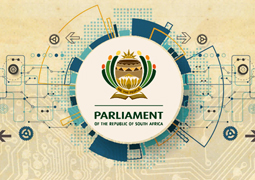
South Africa might have to develop new laws and modernise its policy frameworks in technology to prepare for the radical technological changes that will come with the Fourth Industrial Revolution, a disruptive advancement in digital technology that will have a major impact in the way of doing things in the world.
The Minister of Science and Technology, Ms Mmamoloko Kubayi-Ngubane, told guests at the Legacy Summit of the Speakers’ Forum at Parliament on Wednesday, that existing laws and policy frameworks will have to be modernised to be able to deal with the new technological changes.
The Minister was taking part in a discussion on the topic: “The Fourth Industrial Revolution or First Digital Revolution – Implications for Parliament and Provincial Legislatures”, as part of the Legacy Summit of the Speakers’ Forum, currently underway at Parliament.
“We will need to adapt and modernise our existing policies, particularly in the areas of labour market regulation, social protection and welfare,” she said.
Some of the examples the Minister mentioned include; the crypto-currency in the financial sector which will require a new regulatory framework, self-driving cars will require a new regulatory framework (who takes responsibility for an accident?).
“Autonomous weapons require a new regulatory framework, data sovereignty in the face of Big data require a new regulatory framework, for example Facebook recently had to account for ‘illegally selling data’ and a new taxation framework will be required in the era of robots,” the Minister explained.
The Minister said South Africa will also require a new cyber security policy and a regulatory framework for gene editing technologies.
Addressing law-makers from both national Parliament and provincial legislatures as well as academics and representatives of the European Union and the United Nations, the Minister said the biggest fear about the Fourth Industrial Revolution is that more jobs will be destroyed than created.
“How do we re-skill our nation to prepare for the Fourth Industrial Revolution, we need a large pool of skills, men and women of all races. We need law-makers who are alive to the fact that technology is about to turn societies on their heads.”
She also announced that the President will be putting together a presidential commission to provide advice on preparations for the Fourth Industrial Revolution. The Fourth Industrial Revolution is characterised by a merging of technologies, that blurs the lines between the physical, digital and biological spheres.
The Fourth Industrial Revolution is underpinned by a number of emerging areas of technological innovation.
“We will do well to remember that technology on its own is not an equaliser, it requires laws and regulations for us to achieve a more equal society,” she said.
Prof Mike Bruton of the Mike Bruton Imagineering, a science development centre, said parliamentarians should appreciate opportunities provided by science and the Fourth Industrial Revolution.
He said it was important for the legislative sector to understand both problems and opportunities, and recognise the importance of a strong science culture in deepening democracy.
“The legislative sector must recognise the crucial role of science in achieving the National Development Plan (NDP) and the Sustainable Development Goals (SDGs) and appreciate the opportunity of the Fourth Industrial Revolution, it is a problem-solving revolution,” said Prof Bruton.
He said it is healthy for scientists and politicians to disagree with one another and to propose alternative ideas for the explanation of the same facts.
“Science helps solve complex problems like poverty, digital divide, climate change, biodiversity loss, infectious diseases, habitat loss, invasive plants and animals,” said Prof Bruton.
By Sakhile Mokoena
29 November 2018

